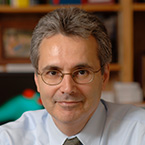
A widely recognized authority on cancer, Dr. DePinho has made important scientific discoveries that have transformed the understanding of fundamental mechanisms responsible for aging and the onset of degenerative diseases and cancer. He led efforts to establish inducible murine cancer models and sophisticated models of melanoma and other cancers that unraveled the genetic underpinnings of carcinogenesis, explored physiological host-tumor interactions, and identified prognostic biomarkers for prostate cancer and targets for drugs in clinical trials.
Dr. DePinho coined the concept of “tumor maintenance,” whereby a cancer-initiating oncogene may remain active throughout tumorigenesis, despite the presence of additional acquired mutations, a finding that has proved essential for the development of cancer therapeutics. Similarly, his concept of collateral lethality reveals cancer-specific therapeutic vulnerabilities. He also utilized mouse models to elucidate the function of telomeres and how their dysfunction correlates with cancer risk. He demonstrated that impaired DNA damage checkpoint signaling, coupled with telomere dysfunction, drives epithelial carcinogenesis and increased rates of chromosomal abnormalities capable of contributing to cancer onset. Dr. DePinho was the first to prove that chronic degenerative diseases can be a direct result of telomere dysfunction and that telomerase activation may prove efficacious in treating chronic conditions and some cancers. He also elucidated a core pathway of aging by linking genotoxic stress, oxidative injury and mitochondrial dysfunction, and by showing that aging is a reversible process.
He demonstrated the tumor suppressive roles of the INK4a/ARF locus, linking ARF to regulation of the MDM2-p53 axis and the anti-oncologic role of Mxi1 that antagonizes Myc via the Sin3/HDAC co-repressor complex, thereby establishing a link between sequence-specific transcription factors, chromatin regulation, and the ability of p53 to sense inappropriate cell cycle entry and activate the apoptotic checkpoint. He also launched the Moon Shots Program, a goal-oriented initiative driven by large teams with enabling technology and resources, which is leading to practice-changing cancer care.
Career Highlights
2018 Leadership in Scientific Achievement Award, Portuguese-American Leadership Council of the United States
2017 Elected Foreign Member, Royal Academy of Science, Portugal
2017 Ellis Island Medal of Honor, National Ethnic Coalition of Organizations
2015 Order of Saint James of the Sword (knighthood), Republic of Portugal
2014 Elected Fellow, American Association for the Advancement of Science
2012 American Italian Cancer Foundation Prize for Scientific Excellence in Medicine
2012 Elected Member, National Academy of Sciences, Washington, D.C.
2010 Elected Fellow, American Academy of Arts and Sciences
2009 Albert Szent-Györgyi Prize for Progress in Cancer Research
2007 Helsinki Medal
2004 Elected Member, Institute of Medicine
2003 AACR-G.H.A. Clowes Memorial Award
2003 Senior Scholar Award, Ellison Medical Foundation
2002 Stanley J. Korsmeyer Award, American Society for Clinical Investigation
2001-2004 Board of Directors, AACR
2000 Clair W. & Richard P. Morse Research Award, Dana-Farber Cancer Institute
2000 Kirsch Senior Investigator Award
1995 Irma T. Hirschl Career Scientist Award
1993 Melini Award for Excellence in Biomedical Research
1981 MD, Albert Einstein College of Medicine